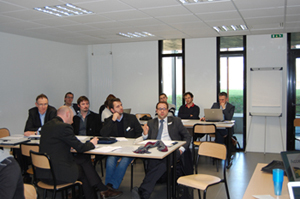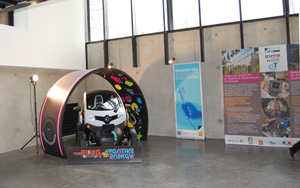 |
||
 |
L'@ctu de l'ESIGELEC - IRSEEM |  |
|
February 2013 - n°4
|
 |
|
A look back at the Normandy Days on Electro-mobility |
 ESIGELEC-IRSEEM organised the first Normandy Days on Electro-mobility on 23 and 24 January 2013. This event, which is part of the European sustainable transport projects BATTERIE* and ENEVATE**, in which ESIGELEC and IRSEEM are taking part, was attended by no fewer than 40 partners from 9 European countries and some twenty businesses. The event started with an opening ceremony attended by Eric Durieux, Managing Director of ESIGELEC-IRSEEM, Alain Ovide, Mayor of Cléon and Vice-Chairman of the CREA in charge of sustainable development, as well as Nicolas Mayer-Rossignol, Vice-Chairman of the Upper Normandy Region in the field of employment, the economy and energy.  Two electric vehicles were on display in the CISE hall on the fringe of the event: the new Renault Twizy, a 100% electric urban car somewhere between car and scooter, which participants were able to try out in the CISE’s car park, and a fully electric utility vehicle by Biocar, an SME from Dieppe which is collaborating with IRSEEM on the Virtuose project. This event is proof of ESIGELEC/IRSEEM’s commitment to the themes of electromobility and sustainable transport, themes which are central to the concerns of the Region and the CREA. *About the BATTERIE project
The general aim of BATTERIE (Better Accessible Transport to Encourage Robust Intermodal Enterprise) is to suggest directions for improving the quality of transport within the Atlantic area by optimising intermodality at the level of road, rail, maritime and air transport networks. Starting with an analysis of how current intermodal networks function, and the impact of intelligent technologies and alternative energies, BATTERIE’s partners wish to develop scenarios and models to change behaviours and national and European policies, and implement transnational pilot networks.Further information: http://www.batterie.eu.com/?splash=off **About the ENEVATE project
ENEVATE (European Network of Electric Vehicles and Transferring) is a network of 15 partners in North-West Europe: universities, research centres, automotive clusters and energy professionals. Launched in 2009, this project aims to promote and accelerate the introduction of electric vehicles in the regions of North-West Europe. One of the aims of the project is to promote better coordination of research and training in issues relating to electric vehicles and energy, and to develop an institutional framework that favours the deployment of mobility with low carbon emissions. Many workshops and seminars have been organised by ENEVATE in the various partner countries. This active collaboration has made it possible to identify the opportunities and challenges that all regions need to take up, on a practical and political level, in order to introduce electric vehicles.Further information: http://www.enevate.eu/  |
|
Contact : Xavier Savatier, Deputy Head of the Embedded Systems and Instrumentation Department, Manager of the Instrumentation, IT and Systems Research Cluster, xavier.savatier@esigelec.fr
|